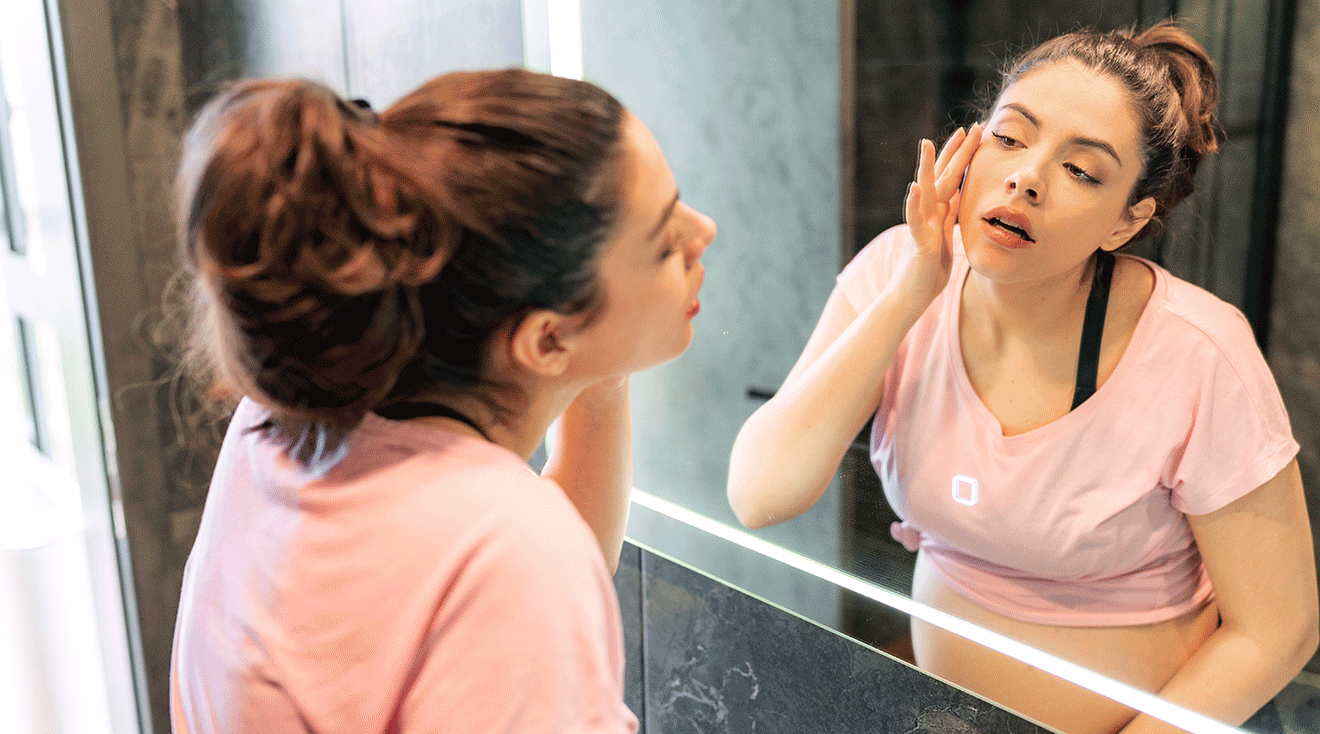What's the Deal With Pregnancy Acne?
When you first learned you were expecting, you were probably anticipating the morning sickness, swollen ankles and back pain to come. But one thing that probably wasn’t on your radar: pregnancy acne. What does the skin on your face have to do with growing a little one? Well, thanks to hormones, your complexion and your pregnancy are most certainly linked. If you’ve got the pimples to prove it, here’s what you need to know about why you’re dealing with acne during pregnancy, along with what you can (and can’t) do to treat it safely.
It’s actually not anything special or pregnancy-specific: it’s just acne that occurs during pregnancy as a result of the hormonal changes happening to your body. The term “pregnancy acne” simply refers to when and why these pimples pop up.
Up to half of all pregnant women develop acne during pregnancy, says Melissa Terry, MD, an ob-gyn at University of Missouri Health Care, usually because of the high levels of hormones that come with the territory—in particular, progesterone.
“Progesterone causes increased levels of oil production by the skin, and this extra oil, called sebum, clogs the pores on the face, trapping bacteria and leading to acne,” explains Dr. Terry. Genetics and high levels of stress can also make you more likely to experience acne during pregnancy, she adds, noting that if a woman typically develops acne breakouts during her period, then she’s more likely to experience pregnancy acne. A 2017 study also suggests that the majority of pregnant women with severe acne during pregnancy had acne prior to becoming pregnant (and will likely have it in future pregnancies too).
Since pregnancy acne is triggered by fluctuating hormones, it can start at any time during your nine+ month journey.
Terry says that many women will have more pronounced pregnancy acne in the first and second trimesters, when hormone levels are peaking, and then experience some improvement during the third trimester. On the other hand, Traci DeSplinter, MD, an ob-gyn at Houston Methodist Willowbrook Hospital, notes that it may be most pronounced during the third trimester for other women since that’s when the sebaceous glands of the skin are most active.
If you’re a fan of old wives’ tales, you might have heard that acne is a sign you’re having a girl. (There’s the old old adage that says boys give you a nice healthy glow, while girls will “steal your beauty.”)
DeSplinter confirms that having acne during pregnancy doesn’t predict the sex of baby. You’ll have to wait to find out for sure via blood test after 10 weeks gestation or during the anatomy scan around mid-pregnancy. (So hold off on picking a paint color for the nursery until then!)
Although pregnancy acne isn’t technically a unique kind of acne, it does have some notable trademarks. First, it can pop up pretty much anywhere, like your face, neck, chest or back, says Sonia Batra, MD, dermatologist and founder of Batra Dermatology in Santa Monica, California. No area is off-limits, but because this acne is triggered by hormones, Batra adds that the lower face and jawline tend to get affected.
Secondly, you can also thank your hormones for the type of acne you might experience: “Since acne during pregnancy is fueled by androgen hormones such as progesterone, it’s more common to have bumps under the skin surface, clogging and congestion of the lower face, and deeper nodules or tender cysts,” explains Batra.
In other words, you might have more to deal with than the occasional whitehead or smattering of blackheads across your nose. This type of acne is sometimes referred to as nodular acne and is known for being red, painful and prone to scarring, per the University of New Mexico Health.
Like many other health conditions that can occur during this journey, coping with pregnancy acne can be complicated, because some treatments aren’t considered safe for use. In fact, some common acne treatments have been shown to increase the risk of birth defects, per the American Academy of Dermatology Association (AAD), so it’s important to know which treatments you can use and which you should avoid.
Pregnancy safe acne treatment options
Although you may need to switch up some of your usual acne treatments, the good news is there are still many ways to safely treat acne during pregnancy.
If you’re looking for safe products with acne-fighting active ingredients, you can use:
OTC facial cleansers, washes, serums and spot treatments with the active ingredients salicylic acid, benzoyl peroxide, glycolic acid and azelaic acid, says Batra. Prescription acne treatments with erythromycin and clindamycin if your acne requires a topical antibiotic, per Terry.
Batra says you should also switch to gentle, scent-free, dye-free cleansers and moisturizers that maintain the natural skin barrier and calm inflammation.
Additionally, Terry says that practicing basic skin hygiene can also help alleviate pregnancy acne. She recommends:
- Using oil-free and non-comedogenic makeup and face products
- Washing your hair and pillowcases regularly, especially if your hair is oily
- Leaving breakouts alone (i.e. don’t squeeze or pop blemishes—this only prolongs the healing process!)
- Avoiding touching your face
- Limiting stress as much as possible
- Eating healthy, non-processed foods
- Hydrating to keep your skin from becoming too dry and overproducing oil
What products aren’t safe to use for pregnancy acne?
While there are many safe ways to treat pregnancy acne, there are also several active ingredients you should avoid unless your healthcare provider tells you otherwise. Terry says pregnant people should avoid the following acne treatments and ingredients:
Topical retinoids, including isotretinoin and adapalene Oral antibiotics such as tetracycline, doxycycline and minocycline Hormone blockers such as estrogen, flutamide and spironolactone
These have been shown to have potential negative effects on a developing baby. Topical and oral retinoids as well as hormone blockers can cause birth defects, adds Batra, and the oral antibiotics listed above can affect the growth of baby’s teeth and bones, according to research.
That said, it’s worth talking to your doctor if you’re taking acne medication prior to becoming pregnant.
According to DeSplinter, the pregnancy acne typically gets better within a few weeks after delivery, though you may still experience some temporary postpartum acne. As your hormone levels return to normal, the excess oil production will slow down and your skin should start to clear.
Please note: The Bump and the materials and information it contains are not intended to, and do not constitute, medical or other health advice or diagnosis and should not be used as such. You should always consult with a qualified physician or health professional about your specific circumstances.
Plus, more from The Bump:
Sonia Batra, MD, dermatologist and founder of Batra Dermatology in Santa Monica, California. She earned her medical degree and master’s in public health from Harvard University.
Traci DeSplinter, MD, is an ob-gyn at Houston Methodist Willowbrook Hospital. She earned her medical degree from Texas Tech University Health Sciences Center.
Melissa Terry, MD, is an ob-gyn at University of Missouri Health Care. She earned her medical degree from the University of Missouri Columbia. International Journal of Women’s Dermatology, Management of severe acne during pregnancy: A case report and review of the literature, September 2017 University of New Mexico Health, Pregnancy Acne: Top 3 Questions, Answered, June 2022
American Academy of Dermatology Association, Is Any Acne Treatment Safe To Use During Pregnancy?, 2014
StatPearls, Tetracycline, 2023
Learn how we ensure the accuracy of our content through our editorial and medical review process.
Navigate forward to interact with the calendar and select a date. Press the question mark key to get the keyboard shortcuts for changing dates.





















































